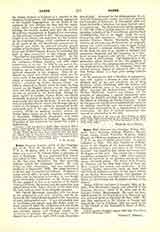

Baker, FRANCIS ASBURY, priest of the Congregation of St. Paul the Apostle, b. Baltimore, Md., U.S.A., March 30, 1820; d. April 4, 1865. Father Baker was a son of Dr. Samuel Baker, a physician of note in Baltimore. He was graduated from Princeton College in 1839. His parents, whom he lost early in life, had been Methodists, but their surviving children joined the Episcopal Church. He took orders in that communion, and was ordained a presbyter in September, 1846. His career promised to be not only successful but brilliant. Possessed of many mental gifts, he had, moreover, refinement, wealth, and an engaging personality; he was deeply pious, thoroughly consecrated to his chosen work. He was assigned at first as an assistant at St. Paul’s Episcopal Church, Baltimore, and six years later was named rector of St. Luke’s Church in the same city. He took rank at once as an eloquent preacher.
The Oxford Movement coincided with the years of his preparation and early ministry, and its influence in the United States resulted in the conversion of many distinguished men. It was not possible that an intelligent and sincere man like Baker could remain unmoved amid the awakening and the return to Catholic principles which the study of primitive and patristic history and theology caused. The severance of intimate ties cost him much, but he obeyed the call and in April, 1853, made his profession of faith. Attracted to the religious state, he entered the Redemptorist Order, was ordained priest in the Cathedral of Baltimore, September 21, 1856, and began forthwith a laborious but most fruitful career as a missionary. The Redemptorists had inaugurated in 1851 the work of giving missions to the English-speaking Catholics of the United States, and the flood of immigration, then at its height, made the work exhausting and continuous. The missionary band included Fathers Hecker, Walworth, Hewit, and Deshon, all converts and all Americans, an unusually strong and varied combination, and to them Father Baker proved a welcome acquisition. He brought to his work the zeal of an apostle, a matured and persuasive eloquence, and the attraction of a character at once magnetic and saintly. Nor are these the words of mere eulogy. The recollections of the generation which listened to him, the judgment of competent critics, the numerous conversions, the abiding impressions he effected, the evidences which his printed sermons display of oratorical gifts—all entitle Father Baker to a high place among Catholic preachers.
In his sermons we find a blending of argumentation with appeal, a diction at once forceful and finished, and an apt and abundant use of Holy Scripture, which, combining with his earnest and dignified delivery, gave to his message a powerful effect. Leaving the Redemptorists with Fathers Hecker, Walworth, Hewitt, and Deshon, for the purpose of organizing a special missionary community for English parishes, he shared with them the labor of founding the Paulist Institute. It was he who gave the impulse and established the tradition of rubrical exactitude and ceremonial splendor which have continued to be a characteristic of that community. He died of typhoid pneumonia contracted in ministering to the sick.
MICHAEL PAUL SMITH

